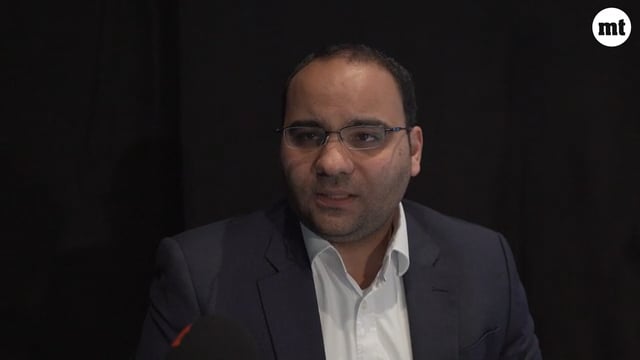Taxman will collect better but Malta must ‘do more with less’, Caruana tells financial services lobby
Malta braces itself for OECD minimum tax reform and impact on FDI, with plan for better tax collection system and leaner government spending, finance minister Clyde Caruana tells financial services lobby


Finance minister Clyde Caruana has told Malta’s financial services lobby that European political integration is deepening in the face of the Russian war in Ukraine, with a direct impact on banking and taxation reform which the island must be prepared to align itself with.
Malta is currently discussing with the OECD as well as taxation counterparts in Ireland on reforming its national minimum tax laws for corporations, in line with the Pillar 2 rules for a minimum effective 15% rate on cross-border profits for large multinational corporations.
But with the tax reform in various EU member states set to start from 1 January, 2024, Caruana told his audience of seasoned financial services practitioners, that the momentum on tax reform was unstoppable.
“The worst thing we can do, is stay put or be complacent, or to think European bureacracy will strangle this. You’d be dead wrong.”
Caruana said the effects of the Russian invasion in Ukraine had changed the European frame of mind, and that it was now seeking further enlargement to secure its borders, as well as to emerge as a global player than can face Chinese supremacy.
“Until recently everyone made it difficult for the EU to get things done... now that attitude has changed radically. By the end of the decade, the Union will have rediscovered its identity and will for further political integration.”
Caruana said this would mean more EU demands to commit to invest in its own industries, further the Green New Deal, and generate more growth from its own resources. “By 2030 the EU will move to further powers and more harmonisation – it will mean moving away from unanimity on rules and to further qualified majority voting.”
Caruana will be piloting a radical consolidation of Malta’s tax collection system, employing an AI solution that can connect all information points on assets and transactions across the government’s various revenue departments.
“We are reforming our 30-year tax regime, and it must serve us for the next three decades. For us to retain our appeal in terms of foreign direct investment, it must be a lean tax collection service: what must be collected, must be paid.”
Caruana also said the government’s commitment to fiscal consolidation in the wake of post-pandemic spending, as well as its subsidy on energy prices, had to prevent any shocks to the Maltese economy. “That is why we must collect what is due, and become leaner in terms of government expenditure. We’ll have to do more with less, even while the EU pushes member states on increasing green infrastructure spending.”
Tax system
Malta does not have a distinct corporate tax regime and the top tax rate for companies is 35% just like personal taxation. However, Malta applies an imputation system that affords companies generous refunds on profits that are taxed here. This system effectively reduces the tax rate for companies to 5%.
The system was cleared by the European Commission when Malta joined the EU. But, over the years, larger countries like Germany and France have applied pressure for harmonised corporate taxes to stop large companies from shifting profits to low-tax jurisdictions like Malta.
Taxation is a national competence and any changes at EU level require unanimous support at Council level.
Malta has always opposed any move towards tax harmonisation at EU level but lost a significant ally when the UK left the bloc.
Eventually, Malta acquiesced to the less radical stand adopted by the OECD for the introduction of a global minimum tax of 15% on company profits. This would have necessitated an overhaul of the current system.


.jpeg)



.jpg)










.png)




